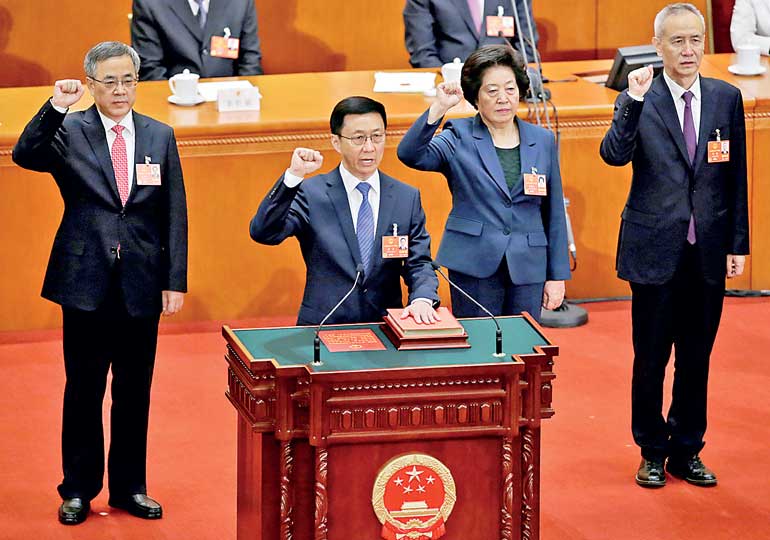Sunday Feb 22, 2026
Sunday Feb 22, 2026
Tuesday, 20 March 2018 00:00 - - {{hitsCtrl.values.hits}}
 Newly elected Vice Premiers (L-R) Hu Chunhua, Han Zheng, Sun Chunlan and Liu He take an oath to the constitution at the seventh plenary session of the National People’s Congress (NPC) at the Great Hall of the People in Beijing, China March 19, 2018 – REUTERS
Newly elected Vice Premiers (L-R) Hu Chunhua, Han Zheng, Sun Chunlan and Liu He take an oath to the constitution at the seventh plenary session of the National People’s Congress (NPC) at the Great Hall of the People in Beijing, China March 19, 2018 – REUTERS
BEIJING (Reuters): Liu He, a key economic adviser to China’s President Xi Jinping, was elected by parliament to be a vice premier, while vice central bank governor Yi Gang was chosen to take over the helm at the People’s Bank of China (PBOC).
Liu’s promotion telegraphs Beijing’s intention to press ahead with a clampdown on riskier financing and a rapid build-up in debt to reduce systemic risks to the world’s second-largest economy.
Liu, a Xi confidante, has a deep understanding of the country’s economic issues and is an emerging star in Chinese politics.
Liu, who won a top Chinese economics study award in 2015 for his research on the global financial crisis, is widely seen as masterminding Xi’s supply-side reforms which are cutting excess factory capacity and pivoting the economy away from low-value industries.
Last October, Liu, 66, was elected into the 25-member Politburo, the second-highest tier in Beijing’s political power structure after the seven-member Politburo Standing Committee.
Liu, who speaks fluent English, gained a master’s degree in public administration at Harvard’s Kennedy School of Government in 1995.
He had been the head of the General Office of the ruling Communist Party’s Central Leading Group for Financial and Economic Affairs and a vice minister of the National Development and Reform Commission (NDRC) - China’s top economic planner. Beijing is merging its banking and insurance regulators to better manage its battle against financial risks, giving new powers to policymaking bodies such as the central bank, and creating new ministries as Xi begins his second five-year term as president.
U.S.-educated Yi Gang, 60, a protege of outgoing PBOC chief Zhou Xiaochuan, has been vice PBOC governor since 2008. He is seen as instrumental in steering monetary and currency policy, including the landmark devaluation of the yuan in 2015.
Yi’s appointment is likely to be viewed as a sign of continuity in PBOC’s policies as policymakers try to rein in rein in risks from an increasingly complex financial system without jolting markets or hurting economic growth.
“The main task right now is to implement prudent monetary policy, push forward financial sector reform and opening up, and keep the financial sector stable,” Yi told reporters on the sidelines of Monday’s parliament session at the Great Hall of the People.
But Yi is not regarded as a heavyweight like his boss Zhou, and he may play a supportive role with Liu overseeing the economy and finance sector on the whole, some economists say.
“Frankly speaking, (Yi’s nomination is) a bit unexpected as he holds a relatively low political ranking as the alternative member of CPC Central Committee,” said Tommy Xie, China economist at OCBC Bank in Singapore.
The Central Committee is the largest of the party’s elite decision-making bodies, and is made up of 204 full members and about 170 alternate members.
“In terms of implication, we see policy continuation as Yi will support Liu He to drive economic reform. Both are the main driver to China’s reform in the past few years,” Xie said.
Yi, one of the highest-ranking “sea turtles” – a colloquialism for Chinese returning from overseas - has a PhD in economics from the University of Illinois. He was also the head of the State Administration of Foreign Exchange (SAFE) from 2009 to 2016.
With Yi’s background and his reputation of being pro-reform, his nomination would be good news for foreign investors, Xie also said.
Zhou, 70, who is China’s longest-running central bank head, having taken the job in 2002, is expected to retire soon.
Separately, Liu Kun, head of the budget office of parliament, was elected to be the new finance minister, replacing Xiao Jie. Liu was formerly a vice finance minister.
Zhong Shan was re-elected as the commerce minister. He Lifeng was also re-elected as the head of NDRC.